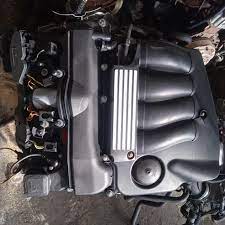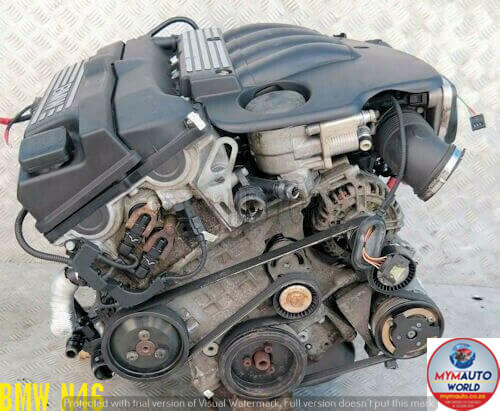N46 Engine Introduction: Specs, Reliability, and Power
N46 Engine Introduction: Specs, Reliability, and Power
Blog Article
The Ultimate List for Selecting the Right Engine to Boost Your Automotive Experience
Picking the suitable engine for your lorry is a pivotal decision that considerably impacts your overall automobile experience. Secret variables such as your driving style, spending plan constraints, engine efficiency metrics, and ecological considerations play an essential duty in this procedure.
Evaluate Your Driving Design
Assessing your driving design is essential for selecting the right engine, as it straight influences performance, effectiveness, and overall driving experience. Different driving styles call for different engine qualities, which can considerably impact just how a car carries out under different conditions. As an example, if you typically navigate city traffic with regular stops and starts, a smaller sized, turbocharged engine might provide the receptive acceleration and gas efficiency you require. On the other hand, if your driving is mainly on highways or entails towing, a bigger, naturally aspirated engine might use the power and torque essential for sustained efficiency.
Furthermore, think about how you prioritize elements such as handling, comfort, and speed. A driver that takes pleasure in spirited driving on winding roadways might gain from a high-revving engine coupled with a manual transmission, while those that prioritize a smooth, silent ride might choose a larger engine with refined power distribution.
Moreover, evaluating your regular driving environmentâEUR" metropolitan, country, or mixedâEUR" can additionally inform your engine choice. Eventually, comprehending your driving design not just boosts your satisfaction of the car yet also guarantees you pick an engine that straightens with your certain needs and choices.
Determine Your Budget Plan
Developing a budget is a vital action in picking the right engine for your lorry. It acts as the structure upon which all subsequent decisions are made, making certain that you continue to be within your financial restrictions while accomplishing your vehicle goals (n46 engine). Begin by figuring out how much you can easily designate for the engine, taking into consideration both the preliminary acquisition price and any kind of extra costs, such as setup, maintenance, and potential modifications
When formulating your spending plan, it is important to take into account the long-term expenses related to engine possession. This includes gas efficiency, insurance policy premiums, and any necessary upgrades that might arise in time. Researching various engine options within your budget plan will help you identify prospective prospects that satisfy your needs without endangering on high quality or efficiency.
Additionally, consider the possibility of unpredicted costs or contingencies that may emerge throughout the engine selection process. Having a barrier in your budget can prevent economic stress down the line. By very carefully determining your budget, you position on your own to make enlightened decisions, making sure that the engine you select straightens with both your economic restraints and driving ambitions.
Evaluate Engine Performance
Once you have a clear spending plan in position, the following action is read this to review engine efficiency, which plays a pivotal duty in establishing the general driving experience - n46 engine. Engine performance is generally evaluated through metrics such as horse power, responsiveness, velocity, and torque. Horse power indicates the engine's capacity to do work, while torque mirrors the engine's rotational force, crucial for jobs such as towing or off-road driving
Acceleration times, commonly gauged from 0 to 60 mph, provide understanding into exactly how quickly a lorry can reach greater rates, affecting its viability for different driving problems. Additionally, the engine's responsiveness, or exactly how quickly it reacts to throttle input, is important for assessing drivability in metropolitan setups or during overtaking maneuvers on freeways.
A high-performance engine might be more suitable for stylish driving, while a more well balanced engine might be excellent for everyday travelling. Involving with these facets will certainly aid you pick an engine that lines up with your driving preferences and improves your automobile experience.
Think About Fuel Efficiency
Considering gas performance is critical for making an educated decision when choosing an engine, as it directly affects both running prices and ecological sustainability. An engine that offers optimal gas economic situation can dramatically minimize the frequency and cost of refueling, thus boosting your general driving experience.
When examining fuel performance, it is vital to examine the published here engine's miles per gallon (MPG) ratings and recognize just how they associate with your common driving patterns. For city driving, look for engines that master stop-and-go conditions, while for freeway driving, prioritize those that keep efficiency over much longer ranges. Additionally, think about the kind of gas the engine requires; engines created for regular gas typically give better gas performance compared to those requiring premium fuels.
In today's market, innovations in innovation, such as turbocharging and hybrid systems, supply both power and efficiency, permitting an enjoyable driving experience without compromising gas mileage. Understanding the engine's exhausts can provide understanding into its environmental impact. By meticulously considering fuel effectiveness, you can pick an engine that straightens with your financial goals and sustainability values, inevitably boosting your automotive experience.
Research Maintenance Requirements
Examining an engine's upkeep demands is an essential element of the choice procedure, particularly after analyzing gas performance. The lasting prices linked with engine maintenance can dramatically impact your overall automotive experience. Thus, understanding the specific upkeep demands of the engine you are taking into consideration is crucial.

An additional important aspect is the engine's reliability. Engines understood for their resilience might require less constant maintenance, eventually conserving you money and time. Seek owner evaluations and experienced opinions to assess the engine's historic performance and usual concerns.

Final Thought
Choosing the appropriate engine is essential for optimizing the auto experience. Eventually, a well-considered engine option not only boosts driving complete satisfaction yet also adds to total car performance and environmental duty.
Assessing your driving style is critical for selecting the ideal engine, as it straight influences performance, effectiveness, and total driving experience. Horsepower shows the engine's ability to carry out work, while torque mirrors the engine's rotational pressure, essential for jobs such as towing or off-road driving.
A high-performance engine might be more effective for flashy driving, while a more balanced engine might be suitable for day-to-day travelling. Involving with these aspects will help you choose an engine that lines this article up with your driving choices and boosts your auto experience.
Additionally, consider the type of fuel the engine requires; engines designed for routine fuel usually provide better gas efficiency contrasted to those requiring costs gas.
Report this page